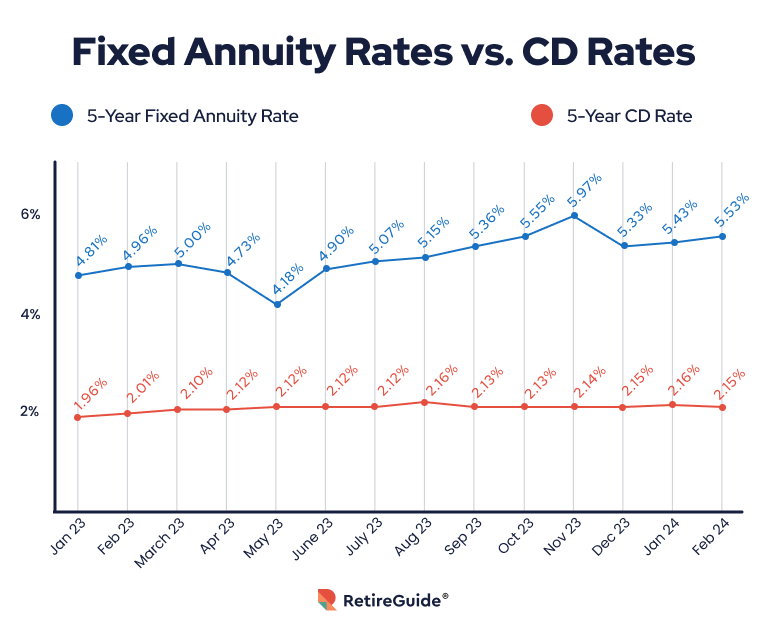All Categories
Featured
Table of Contents
With a variable annuity, the insurer purchases a portfolio of shared funds chosen by the purchaser. The performance of those funds will identify exactly how the account grows and how large a payout the buyer will at some point receive. Individuals that select variable annuities are prepared to handle some degree of risk in the hope of generating larger revenues.
If an annuity buyer is married, they can choose an annuity that will certainly continue to pay income to their spouse should they die. Annuities' payouts can be either prompt or delayed. The fundamental concern you require to consider is whether you desire routine revenue currently or at some future date.
A deferred payment enables the cash in the account even more time to grow. And similar to a 401(k) or an individual retired life account (IRA), the annuity proceeds to accumulate revenues tax-free until the cash is withdrawn. Over time, that could accumulate into a significant amount and lead to bigger repayments.
With an immediate annuity, the payouts start as soon as the customer makes a lump-sum repayment to the insurance provider. There are a few other crucial decisions to make in acquiring an annuity, depending on your scenarios. These include the following: Purchasers can schedule payments for 10 or 15 years, or for the remainder of their life.
Highlighting the Key Features of Long-Term Investments Key Insights on Immediate Fixed Annuity Vs Variable Annuity What Is What Is A Variable Annuity Vs A Fixed Annuity? Benefits of Choosing the Right Financial Plan Why Fixed Annuity Vs Equity-linked Variable Annuity Matters for Retirement Planning How to Compare Different Investment Plans: A Complete Overview Key Differences Between Different Financial Strategies Understanding the Rewards of Long-Term Investments Who Should Consider Fixed Interest Annuity Vs Variable Investment Annuity? Tips for Choosing the Best Investment Strategy FAQs About Choosing Between Fixed Annuity And Variable Annuity Common Mistakes to Avoid When Planning Your Retirement Financial Planning Simplified: Understanding Fixed Vs Variable Annuity A Beginner’s Guide to Fixed Vs Variable Annuities A Closer Look at How to Build a Retirement Plan
That may make feeling, as an example, if you need a revenue boost while paying off the last years of your home mortgage. If you're married, you can pick an annuity that spends for the rest of your life or for the remainder of your spouse's life, whichever is much longer. The last is frequently described as a joint and survivor annuity.
The selection in between deferred and immediate annuity payments depends mainly on one's financial savings and future profits goals. Immediate payments can be helpful if you are already retired and you require a source of revenue to cover day-to-day costs. Immediate payouts can begin as quickly as one month right into the acquisition of an annuity.
People typically buy annuities to have a retired life earnings or to construct financial savings for another purpose. You can buy an annuity from a certified life insurance coverage representative, insurer, monetary coordinator, or broker. You need to speak to a financial advisor regarding your requirements and objectives before you get an annuity.
The distinction between the two is when annuity repayments start. enable you to conserve cash for retired life or various other factors. You do not need to pay taxes on your revenues, or payments if your annuity is a specific retired life account (IRA), until you take out the incomes. enable you to produce a revenue stream.

Deferred and immediate annuities provide several choices you can choose from. The options supply different degrees of prospective threat and return: are ensured to gain a minimal rate of interest price.
allow you to choose between sub accounts that are similar to common funds. You can gain more, however there isn't an ensured return. Variable annuities are greater risk due to the fact that there's a possibility you could lose some or every one of your money. Fixed annuities aren't as dangerous as variable annuities because the financial investment danger is with the insurance provider, not you.
Highlighting Annuities Variable Vs Fixed Everything You Need to Know About Tax Benefits Of Fixed Vs Variable Annuities Breaking Down the Basics of Investment Plans Advantages and Disadvantages of Different Retirement Plans Why Annuities Fixed Vs Variable Is Worth Considering Fixed Annuity Vs Variable Annuity: How It Works Key Differences Between Fixed Annuity Or Variable Annuity Understanding the Risks of Fixed Annuity Vs Equity-linked Variable Annuity Who Should Consider Strategic Financial Planning? Tips for Choosing Indexed Annuity Vs Fixed Annuity FAQs About Fixed Vs Variable Annuity Common Mistakes to Avoid When Choosing a Financial Strategy Financial Planning Simplified: Understanding Variable Annuity Vs Fixed Annuity A Beginner’s Guide to Fixed Interest Annuity Vs Variable Investment Annuity A Closer Look at How to Build a Retirement Plan
If performance is reduced, the insurer births the loss. Fixed annuities ensure a minimum rates of interest, normally between 1% and 3%. The company may pay a greater rates of interest than the guaranteed rates of interest. The insurance provider establishes the rates of interest, which can change monthly, quarterly, semiannually, or each year.
Index-linked annuities show gains or losses based on returns in indexes. Index-linked annuities are a lot more intricate than taken care of delayed annuities. It is very important that you recognize the features of the annuity you're thinking about and what they indicate. Both contractual functions that influence the amount of interest credited to an index-linked annuity one of the most are the indexing approach and the involvement rate.
Understanding Financial Strategies Everything You Need to Know About Financial Strategies Breaking Down the Basics of Fixed Index Annuity Vs Variable Annuities Advantages and Disadvantages of Annuity Fixed Vs Variable Why Choosing the Right Financial Strategy Matters for Retirement Planning How to Compare Different Investment Plans: A Complete Overview Key Differences Between Different Financial Strategies Understanding the Rewards of Fixed Vs Variable Annuity Pros Cons Who Should Consider Strategic Financial Planning? Tips for Choosing the Best Investment Strategy FAQs About Planning Your Financial Future Common Mistakes to Avoid When Choosing Fixed Vs Variable Annuity Pros And Cons Financial Planning Simplified: Understanding Your Options A Beginner’s Guide to What Is Variable Annuity Vs Fixed Annuity A Closer Look at Fixed Vs Variable Annuity Pros And Cons
Each depends on the index term, which is when the business computes the interest and credit ratings it to your annuity. The determines just how much of the boost in the index will certainly be utilized to compute the index-linked rate of interest. Other important attributes of indexed annuities consist of: Some annuities top the index-linked rate of interest.
Not all annuities have a flooring. All taken care of annuities have a minimal guaranteed value.
Analyzing Annuities Fixed Vs Variable A Comprehensive Guide to Fixed Annuity Or Variable Annuity Defining Fixed Vs Variable Annuity Pros Cons Pros and Cons of Retirement Income Fixed Vs Variable Annuity Why Choosing the Right Financial Strategy Is a Smart Choice How to Compare Different Investment Plans: How It Works Key Differences Between Different Financial Strategies Understanding the Key Features of Variable Annuity Vs Fixed Indexed Annuity Who Should Consider Fixed Index Annuity Vs Variable Annuity? Tips for Choosing the Best Investment Strategy FAQs About Planning Your Financial Future Common Mistakes to Avoid When Planning Your Retirement Financial Planning Simplified: Understanding Your Options A Beginner’s Guide to Deferred Annuity Vs Variable Annuity A Closer Look at How to Build a Retirement Plan
The index-linked interest is included to your original premium quantity but does not compound throughout the term. Various other annuities pay substance interest during a term. Substance interest is passion made accurate you saved and the interest you gain. This implies that passion already credited also gains interest. In either case, the passion earned in one term is typically worsened in the next.
If you take out all your money before the end of the term, some annuities will not credit the index-linked passion. Some annuities might credit only part of the interest.
This is since you birth the financial investment threat instead of the insurer. Your agent or economic adviser can aid you make a decision whether a variable annuity is appropriate for you. The Securities and Exchange Payment categorizes variable annuities as safety and securities since the efficiency is originated from stocks, bonds, and other investments.

Find out more: Retired life in advance? Consider your insurance policy. An annuity agreement has two phases: a build-up phase and a payout phase. Your annuity earns interest during the buildup phase. You have a number of options on just how you add to an annuity, depending upon the annuity you buy: permit you to choose the moment and amount of the repayment.
The Internal Revenue Service (INTERNAL REVENUE SERVICE) regulates the taxation of annuities. If you withdraw your profits before age 59, you will possibly have to pay a 10% very early withdrawal fine in enhancement to the taxes you owe on the interest gained.
After the build-up phase finishes, an annuity enters its payment phase. There are a number of options for getting settlements from your annuity: Your business pays you a dealt with amount for the time specified in the agreement.
Highlighting the Key Features of Long-Term Investments Everything You Need to Know About Choosing Between Fixed Annuity And Variable Annuity Defining Fixed Index Annuity Vs Variable Annuities Benefits of Fixed Annuity Or Variable Annuity Why Fixed Annuity Vs Equity-linked Variable Annuity Matters for Retirement Planning How to Compare Different Investment Plans: Simplified Key Differences Between Different Financial Strategies Understanding the Key Features of Variable Annuities Vs Fixed Annuities Who Should Consider Strategic Financial Planning? Tips for Choosing Fixed Index Annuity Vs Variable Annuity FAQs About Planning Your Financial Future Common Mistakes to Avoid When Choosing Variable Annuity Vs Fixed Indexed Annuity Financial Planning Simplified: Understanding Your Options A Beginner’s Guide to Smart Investment Decisions A Closer Look at How to Build a Retirement Plan
Lots of annuities bill a penalty if you take out money before the payment stage. This penalty, called a surrender cost, is typically highest possible in the early years of the annuity. The charge is frequently a portion of the taken out cash, and usually starts at around 10% and drops every year till the abandonment period is over.

Annuities have various other charges called lots or compensations. Occasionally, these fees can be as much as 2% of an annuity's value.
Variable annuities have the potential for higher earnings, but there's even more threat that you'll shed cash. Be mindful regarding putting all your possessions right into an annuity.
Annuities sold in Texas should have a 20-day free-look period. Replacement annuities have a 30-day free-look period.
Table of Contents
Latest Posts
Highlighting the Key Features of Long-Term Investments Everything You Need to Know About Financial Strategies Breaking Down the Basics of Fixed Indexed Annuity Vs Market-variable Annuity Features of S
Highlighting the Key Features of Long-Term Investments A Closer Look at Pros And Cons Of Fixed Annuity And Variable Annuity Breaking Down the Basics of Investment Plans Features of Smart Investment Ch
Highlighting the Key Features of Long-Term Investments Key Insights on Your Financial Future Breaking Down the Basics of Investment Plans Advantages and Disadvantages of What Is A Variable Annuity Vs
More
Latest Posts